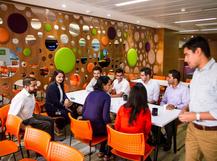
When Krishnali Doshi's manager asked her if she'd mentor young women during her company's summer immersion program for girls interested in technology, Krishnali agreed but didn't know what to expect.
So like any savvy employee worth her salt, she Googled. Her employer, BlackRock, was partnering with Girls Who Code (GWC), a nonprofit organization that is building a future pipeline of female engineers by teaching teenage girls the tech skills they need.
Krishnali couldn't wait to get started. Be a mentor and help others learn coding skills and get ready for a tech career? Yes, please! Having immigrated from Bombay, India just five years ago, she says, “When I was studying science at this age, my class of 120 people only had 10 girls. So I'm especially glad that my organization is helping get more girls in this space, and I love helping in my small way."
Lisa Dallmer, who helped launch the GWC partnership at BlackRock, explains that about 60 employees get involved as mentors, special speakers, and more. And, she says, their involvement expands their viewpoints. Female mentors, for instance, are motivated right alongside their mentees when they attend panels headlined by women who built their tech careers in a male-dominated industry. And nearly every employee involved gains a deeper appreciation of the importance of diversity in the workplace as they see young women from various backgrounds offer unique input.
Who Benefits From Mentorship?
What Krishnali discovered through her experience with GWC is that these types of mentorship programs impact more than just the mentees. In fact, they benefit at least two other groups.
1. You Guessed It! The Mentees
The GWC mentees not only get to take a seven-week course in computer science, but they also meet regularly with an assigned mentor—someone who has already broken into the space and can share their personal experience with them.
The two young women Krishnali mentored came with different backgrounds and plans. When one of them admitted that she didn't see herself coding forever, despite her interest in tech, Krishnali explained her own role as a business analyst at BlackRock. She shared how it's a blend of general coding knowledge and understanding business needs to guide the development team in creating and delivering successful solutions. In this way, she illustrated how you don't necessarily have to code to remain in the tech field—in fact, other skills are just as important—but knowing the basics helps you better collaborate on business projects.
Her other mentee did enjoy coding and immediately used her new skills to build a website supporting her babysitting services. She's also looked outward by creating another website aiming to raise funds for African children in poverty.
“They're both so impressive," says Krishnali. “I am still in touch with them even after the program; I didn't want it to stop there."
2. The Mentors
Since her first experience mentoring, Krishnali has taken on a leadership role with the GWC partnership this year, advising new mentors. She notes that seeing herself as a role model lent her a new perspective. She's had a higher sense of responsibility, which has helped her gain more respect at work.
“I'm more aware of how I want to be perceived," she says, noting that attending the BlackRock Women in Tech panel as a mentor inspired her just as much as it inspired the girls. She now sees more people as potential mentors and is more assertive in seeking them out.
Lisa seconds this phenomenon, noting that everyone who's involved gets excited to watch how the girls in the program grow. And their work with the mentees helps them further appreciate diversity of thought and their own inspiration, which they take back to their internal teams.
"This work opens their minds, making them more interested in the diversity and possibilities from inclusion within our own workforce," she says. “This is especially true when it comes to being more aware of the input women have. People become more aware of how women express their thoughts and ideas in group meetings, often times struggling to get their voices heard,” she explains. “Our volunteers work with these young girls and realize they can adjust their own behavior to be more inclusive.”
3. The Company
As employees become more aware of the benefits diversity brings, the company they work for gets a boost in productivity, morale, and increased perspectives.
"Diverse teams perform at a higher level, innovating more and producing more resilient solutions,” Lisa explains. That's why her company cares about nurturing diversity of thought by encouraging employees to embrace those whose culture, background, race, and gender may differ from their own.
Their partnership with GWC is one example of how mentorship programs can also help the company fostering them. Mentorship—the morale boost we get from providing it, the open-mindedness it fosters, and the collaborative skills we hone while doing it—helps us look outward, better collaborate, and understand what actual success looks like. Lisa says that when her people continue to learn and can make a difference, that's a huge part of why they look forward to coming to work each day.
“This program has brought a new energy and lens," Lisa says, “an injection of fresh ideas."
Find Your Mentor
Even if your company doesn't have a formal mentorship program like BlackRock's partnership with Girls Who Code, you can still look for opportunities to mentor someone or find your own mentor. Often current or past managers serve as a good jumping off point.
Consider using your next one-on-one meeting to ask your manager questions about the skills you should develop to further advance your career—and don't be afraid to be open about seeking mentorship. When people know you admire their own achievements, they're often happy to guide you.
Or, if you're looking to be a mentor, ask a few people in your network if they know someone who is seeking a mentor. Someone who is looking for a similar work experience to your own or wants to build similar skills, but needs some help getting there. Your input may be invaluable to them, and you get to put your past experiences to good use.


